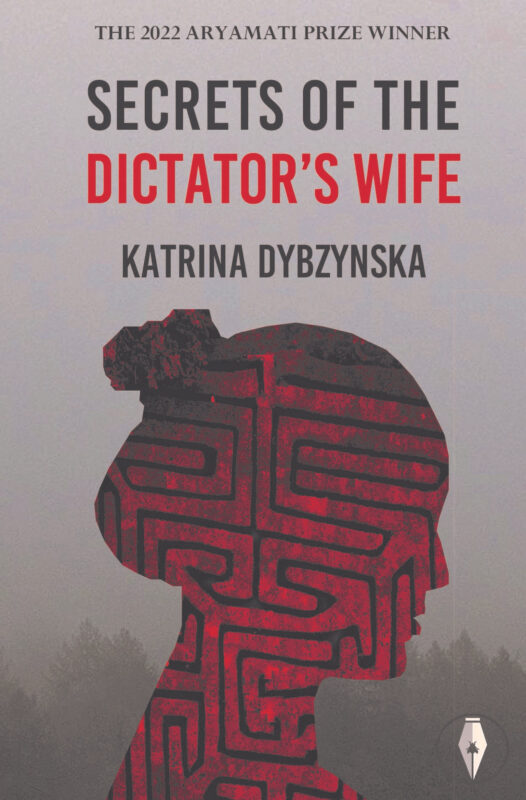REVIEW: KATRINA DYBZYNSKA’S ‘SECRETS OF THE DICTATOR’S WIFE’
By Stella Backhouse

“He bought it for me but it was he/who spent his life admiring walls./The key is to make them see-through, he says.” I don’t know how much Katrina Dybzynska’s self-described ‘nomadic’ lifestyle has seeped into the contents of her Aryamati Prize-winning pamphlet Secrets of the Dictator’s Wife, but this is shape-shifting poetry that intrigues by its unspecific-ness. You sense that it could be placed over an array of different situations and still preserve congruence with whatever outlines showed through from beneath.
This, perhaps, is the first clue that the apparent straight-forwardness of what’s on offer here is actually deceptive. On the face of it, it does what it says on the tin: it documents the inner life of an unnamed woman whose unnamed husband is the dictator of an unnamed country. Reading that “We are not violent; we only do what is necessary./We take no pleasure in setting the barbed wire on top of our wall – ” I even wondered, for a mad moment, if it was inspired by Donald Trump and the Sphynx-like Melania. But Dybzynska’s poems are equally applicable to situations of domestic abuse and coercive control of women by men; and beyond that, they force all of us to ask why we collude every day with social and political norms we don’t agree with and that it isn’t in our interests to uphold.
I was also troubled by a nagging suspicion that what seemed to be reportage from the beating heart of the régime was in fact about outsiderhood – something familiar to Dybzynska, maybe, from her nomadic existence. What if the Dictator’s Wife is actually the threat – real or imaginary – demonised but paradoxically necessary to political leaders of all stripes as their justification for repressive political othering? Because when his wife contrasts the Dictator’s preference for “the reliable structure/of a harbour to the dirt of a beach” with her own enjoyment of “watching the ships disappear./It’s so easy for them to glide out of the picture”, my mind unavoidably turned to migrant boats, arriving in Britain from across the Channel.
Whoever the Dictator’s Wife really is, silence and invisibility are her most effective weapons of resistance. She is invisible to the Dictator firstly because invisibility is what she has cultivated and secondly because he has stopped thinking of her as someone with an independent existence: she describes herself as “a mirror –/shiny, waiting to shatter,/a reflection of someone else”. Silence is more complex; of women in ‘Peaceful Countries’ who do not understand the nuances of her situation, the Wife says they “are quick to judge/silence but in dictatorship even empty banners/shout”. Elsewhere, silence is used against the Wife as an instrument of control: “I am not scared of blizzards/but of the muffled steps in snowy silence”. And again: “The conflicts were never open. A quiet frown/of disapproval, the colors turning pastel”.
Perception, in this world, is everything. Interestingly, Dybznyska discusses this through the couple’s differing reactions to art. The Wife’s favourite painting is The Treachery of Images by René Magritte, although her husband “does not let me/hang it in the bedroom”. When she and the Dictator “watch” Picasso’s Guernica, she “saw symbols falling apart./Deformed pigeon, the parody of peace”. He meanwhile “Perceived fame beyond death./A story of power, strength, justification”. Dybznyska is perhaps warning us not to assume we know what her collection is about; further, she is perhaps warning her fellow-artists that they cannot control how their work is used, and that it may not always be used for benign purposes.
The Dictator’s own dreams about painting focus on the use of black and white only, with no grey areas. He favours firm demarcation, no blurring; the viewer’s gaze must be drawn to the centre. And yet it is precisely at the ‘invisibled’ margins where danger lurks: invisibility assumes a power of its own when “He plans many moves ahead but he does not account/for what happens outside the board”. My hunch is that that this mercurial, sometimes unsettling poetry is about the tension-filled relationship between those at the centre and those at the margins. Or maybe the fact that such is my conclusion tells you more about me than it does about the collection.
Secrets of the Dictator’s Wife is available to purchase online, direct from publisher Fly on the Wall Press, as well as other bookshops and retailers.
